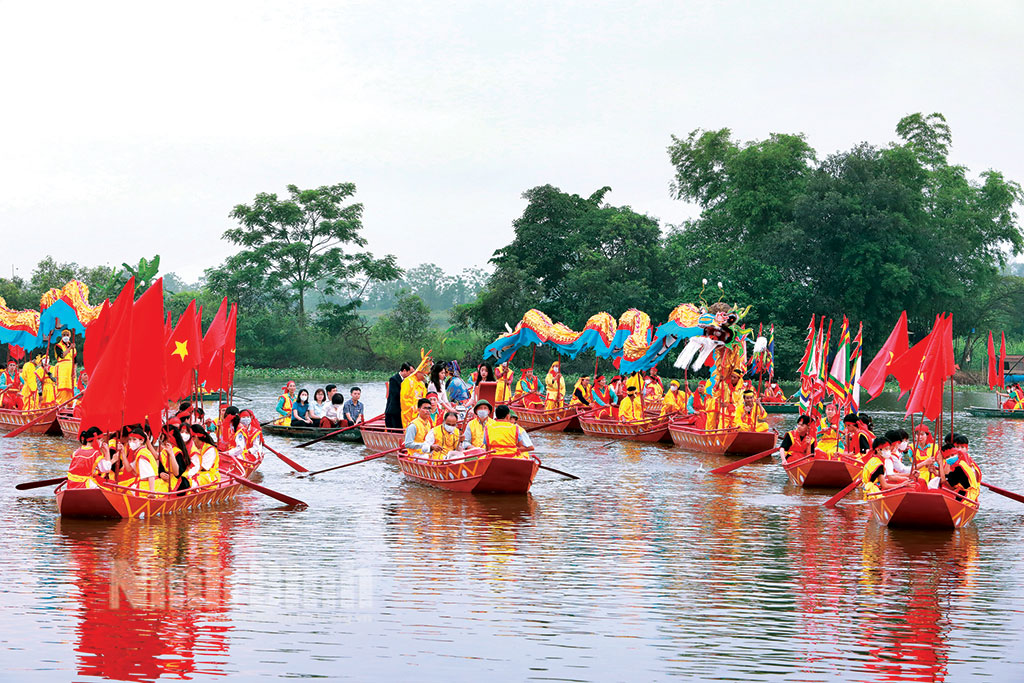Building Hoa Lu - Ninh Binh into millennial heritage urban area: A choice in line with inevitable trend

A historic choice
At a seminar themed "Defining characters of Ninh Binh in association with building local brand names", Senior Lieutenant General Bui Van Nam, former Deputy Minister of Public Security, former Secretary of the Ninh Binh provincial Party Committee, said that over thousands of years of national construction and protection, Ninh Binh has always been a strategic location that recorded numerous historical milestones in safeguarding the nation's independence, sovereignty and territorial integrity.
More than 1,000 years ago, Hoa Lu was chose as the capital of Dai Co Viet feudal state.
To date, the vestige of the ancient capital of Hoa Lu in Truong Yen commune, Hoa Lu district, is one of the four main core parts of Trang An Scenic Landscape Complex.
Speaking at a ceremony marking the 1,050th founding anniversary of the Dai Co Viet feudal state, Nguyen Xuan Thang, Politburo member, President of the Ho Chi Minh National Academy of Politics and Chairman of the Central Theory Council, stressed that "Heritages left from the Dai Co Viet state, King Dinh Tien Hoang, predecessors as well as achievements made by Ninh Binh over the years are very precious. These lay a foundation for Ninh Binh's Party organisation, administration and people to realise the target to become a developed province in the Red River delta by 2030".
In each period of development, Ninh Binh has always adjusted its development policies and strategies in conformity with reality and available sources.
In the early 2000s, it's economy has shifted from "brown" to "green" development, from a material production industry to tourism development, focusing on preserving the natural landscape, historical relic sites, zoning off and banning the exploitation of limestone mountains and special use forests.
Ninh Binh has also stopped licensing projects that use a large area of land, or those with outdated technologies and low economic values. The province's economy has seen consecutive high growth with its scale expanded and right shifting direction of economic structure.
In 2022, Ninh Binh became self-sufficient in budget spending and contributed to the central budget. The per capita income was ranked 12th out of 63 centrally-run cities and provinces. In particular, the province has developed and preserved unique values and identities.
The tourism sector has seen robust growth, and Ninh Binh is listed among 10 cities and provinces receiving the highest numbers of visitors. It has become a popular destination for both domestic and foreign visitors.
The development of green and circular economy has proved that Ninh Binh is catching up with the global trend. Nowadays, many countries have chosen a model of developing green and circular economy. They have also preserved and exploited cultural and historical values in a bid to develop cultural and heritage industries.
An inevitable trend
With its unique features and rich potential of the nature, culture and history, the Party organisation, administration and people of Ninh Binh have been determined to build Hoa Lu into a millennial heritage urban area.
On August 23, 2023, the Ninh Binh Party Committee issued Resolution No.16-NQ/TU on re-arranging administration units at district and commune levels for the period of 2023-2030. By 2025, Hoa Lu district will be merged into Ninh Binh city and complete the re-arrangement of administration units at the commune level.
At the same time, it will work to help the newly established administration of Hoa Lu - Ninh Binh fulfill criteria set for first-tier centrally-run city and Ninh Binh province basically meet criteria set for a centrally-run city before 2030.
After the re-arrangement and merging of administration units at the district and commune levels, the province will build Hoa Lu - Ninh Binh into a millennial heritage urban area.
The future Hoa Lu city will cover the whole scope of Ninh Binh urban general planning scheme while the core of Trang An heritage will make up 30% of Hoa Lu city's area. Hence, turning Hoa Lu - Ninh Binh into a millennial heritage urban area is an inevitable choice.
Speaking at the scientific seminar, Deputy Minister of Construction Nguyen Tuong Van affirmed that "Ninh Binh's choice to build a millennial heritage urban area is right and suitable with the reality and in line with the Politburo's orientations on socio-economic development in the Red River Delta as well as the Party and State's policies on preserving and promoting cultural heritages; managing and developing urban areas in localities that own ancient capitalses or UNESCO-recognised heritages.
Translated by Nguyen Thuy

